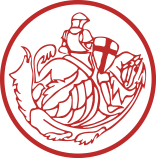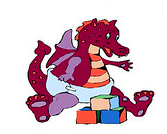Curriculum
Introduction to Your Child's Learning Journey
The Early Years Foundation Stage (EYFS) ensures the needs and learning styles of each child are met, using a variety of resources and the whole nursery environment, indoor and outdoor. All documentation supporting the EYFS are available via www.foundationyears.org.uk. The Foundation Year’s website also includes a range of resources and contacts.
This is a critical stage as it helps your child get ready for school, as well as preparing them for their future learning and successes.
From birth until the age of 5 years old your child’s Early Years’ experience should be happy, active, exciting, fun and secure.
At St George's Nursery, we aim to support children’s development, care and learning needs, as we believe this is where the foundation for lifelong learning can be developed, giving each child the best start in their developmental journey.
We feel that the key to a child’s successful learning journey is based on having an excellent partnership with you. You may wonder what this means.
“Partnership involves parents, families and practitioners working together to benefit children. Each recognises respects and values what the other does and says. Partnership involves responsibility on both sides." Early Years framework, NCCA (2006)
Research shows that children whose parents work in close partnership with their child's nursery:
- Settle quickly
- Feel more secure and benefit more from the educational opportunities given to them
- Move from one setting to another with greater confidence (Transition to school)
- See learning as more enjoyable when their home life is ‘visible’ in the setting
- Enjoy hearing and seeing their home language and celebrations in the setting when their home language is neither English
- Experience more connections between the different settings that support them
How Your Child Will Be Learning
The EYFS Framework explains how and what your child will be learning to support their healthy development.
Your child will be learning skills, acquiring new knowledge and demonstrating their understanding through 7 areas of learning and development.
Areas of Learning
Children should mostly develop the three Prime Areas first. These are:
- communication and language
- physical development
- personal, social and emotional development
These Prime Areas are those most essential for your child's healthy development and future learning.
Communication and Language
Children are given opportunities to experience a rich language environment; to develop confidence and skills in expressing themselves and to speak and listen in a range of situations
1. Listening and attention
2. Understanding
3. Speaking
|
Listening Walk
|
Following Instructions
|
Speaking
|
Physical Development
Children are provided with opportunities to be active and interactive and develop their co-ordination, control and movement. Children will be helped to understand the importance of physical activity and to make healthy choices in relation to food.
1. Moving and handling
2. Health and self-care
|
Balancing
|
Gross Motor Skills
|
Healthy Cooking
|
Personal, Social and Emotional Development
Children are given opportunities to develop a positive sense of themselves and others; to form positive relationships and develop respect for others, to develop social skills and learn how to manage their feelings, to understand appropriate behaviour in groups and have confidence in their own abilities.
1. Self-confidence and self-awareness
2. Managing feelings and behaviours
3. Making relationships
|
I Can!
|
Sharing
|
Friendship
|
As children grow, the Prime Areas will help them to develop skills in four specific areas. These are:
- literacy
- mathematics
- understanding the world
- expressive arts and design
Literacy
Children are encouraged to link sounds and letters and to begin to read and write. Children are given access to reading materials to ignite their interest.
1. Reading
2. Writing
|
Fine motor skills
|
Dough gym
|
Reading
|
Writing
|
Mathematics
Children are provided with opportunities to develop and improve their skills in counting, understanding, using numbers, calculating simple addition and subtraction, and to describe shapes, space and measures.
1. Numbers
2. Shape, Space and Measure
|
Counting Numbers
|
Shapes
|
Space
|
Measure
|
Understanding the World
Children will be guided to make sense of their physical world and their community through opportunities to explore, observe and find out about people, places, technology and the environment.
1. People and Communities
2. The world
3. Technology
|
A visit to the doctors surgery
|
Gardening
|
Welly boot walk
|
Using the interactive whiteboard
|
Expressive Arts and Design
Children are given opportunities to explore and play with a range of media and materials as well as encouragement to share their thoughts, ideas and feelings through a variety of activities in art, music, movement, dance, role-play and design and technology.
1. Exploring and using media and materials
2. Being imaginative
|
Being creative
|
Music and Dance
|
Role Play
|
Singing
|
These seven areas are used to plan your child's learning and activities.
With your support and your child's Key Person teaching, our curriculum planning is designed to be flexible so that staff plan specific and relevant experiences and activities which follow your child's unique needs and interests. Children in the EYFS display various characteristics of effective learning and acquire skills and knowledge by playing and exploring, being active and through creative and critical thinking which takes place both indoors and outdoors.
Planning For Your Child's Learning
We use EyLog (Early Years Log) which is a comprehensive tablet PC and web-based solution for sharing children’s observations, analyses and next steps, with parents. These become part of each child’s Learning Journey. Parents can access their child’s Learning Journey independently at any time through a secure website.
EyLog significantly reduces the time spent on capturing, maintaining observations and managing the learning journey of a child manually; enabling us to focus more on providing the best Early Years education to the children.
EyLog gives access to parents on your child's development on a more regular and real-time basis. Sharing Learning Journeys this way increases parental involvement in the activities at the nursery and understanding of your child’s development.
You will receive a unique login for the system and will be notified automatically by e-mail as soon as a new observation is published to your child’s Learning Journey or when any reports are shared with you by the Nursery. Parents often share their observations with us by uploading photographs or observation of their child’s learning. This give us a holistic view of each child and helps us to plan more effectively for their interests and needs. More information about Eylog can be found in our booklet below.
We also ensure that parents are involved in their child’s learning by talking with them and asking them to complete ‘planning for your child’s interests and needs’ form. We use this information, along with the key person’s observations to plan activities which will meet the needs of your child which continues to support their development and learning.


























